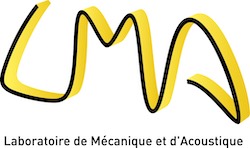The first part of this talk gives an overview on the existing gradient models in Solid Mechanics. The second part is devoted to a basic question : how to include the gradient of the temperature in Thermodynamics ?
- In the last decades, gradient models of solids has been much discussed in Mechanics, in particular the standard gradient models proposed by Gurtin [5] or Frémond [4] give an interesting method to include the gradient of the internal parameter and to derive the governing equations in various domains such as visco-plasticity, plasticity, phase change and damage mechanics.
It is shown here that the governing equations of these models can be derived in terms of the energy and dissipation potentials of the solid within the framework of generalized standard materials. The response of a solid under a quasi-static loading is thus described by an extended Biot equation in which the derivatives are functional derivatives. This result gives the possibility to generate standard gradient models up to any order. In particular, some general results on the response of a solid submitted to a loading path can be discussed in gradient plasticity and in gradient damage in the same way as in classical plasticity.
- The second part, which discusses the possibility to include the gradient of the temperature in Continuum Thermodynamics, is not at all classical. Classical Continuum Thermodynamics is based upon the axiom of the local state which assumes that an element of matter is in thermodynamic equilibrium. The free energy per unit mass is described by the set of state variables which are the temperature and other physical variables. However, in some applications in thermo-mechanics, the temperature fields present very high gradients and it is natural to wonder if the temperature gradient might have some influence on the governing equations [1], for example on the equation of thermal diffusion.
When the temperature gradient is included in the expression of the free energy as a state va- riable, the assumption of the equilibrium local state of Continuum Thermodynamics is clearly not respected. Such an expression deviates from the classical framework of Continumm Thermodyna- mics but still makes sense when the local state is in a steady state. It is then necessary to define a non-classical relationship between the internal energy and the free energy. This subject has been recently discussed in the literature (since 2000,...). and different approaches have been proposed, cf. for example Forest & al.[3], [2] or Nguyen & Andrieux [7], [6]. Our approach is based upon an extended expression of the internal energy in terms of the free energy respecting the duality by Legendre transform with respect to the temperature and the temperature gradient. In particular, it is shown that the proposed approach can be easily understood from a simple micro-macro mode- ling of the thermal diffusion and gives an original possibility to solve the paradox of instantaneous conduction, cf. [6].
References
[1] S. Andrieux and P. de Bonniers. Including thermal gradients into thermo-elastic damaging constitutive laws. Rapport EDF, HI-74 :049–0, 1994.
[2] S. Forest and M. Amestoy. Hypertemperature in thermoelastic solids. C.R. Mecanique, 336 :347–353, 2008.
[3] S. Forest, J.M. Cardona, and R. Sievert. Thermoelasticity of second-grade media. In Maugin, Drouot, and Sidoroff, editors, Continuum Thermodynamics. Kluwer, Dordrecht, 2000.
[4] M. Frémond and B. Nedjar. Damage, gradient of damage and principle of virtual power. Int. J. Solids and Structures, 33 :1083–1103, 1996.
[5] M. E. Gurtin. Generalized ginzburg-landau and cahn-hilliard equations based on a microforce balance.
Physica D, 92 :178–192, 1996.
[6] Q. S. Nguyen. Gradient thermodynamics and heat equations. C. R. Mecanique, 338 :321–326, 2010. [7] Q. S. Nguyen and S. Andrieux. The non-local generalized standard approach : a consistent gradient
theory. C. R. Mecanique, 333 :139–145, 2005.


